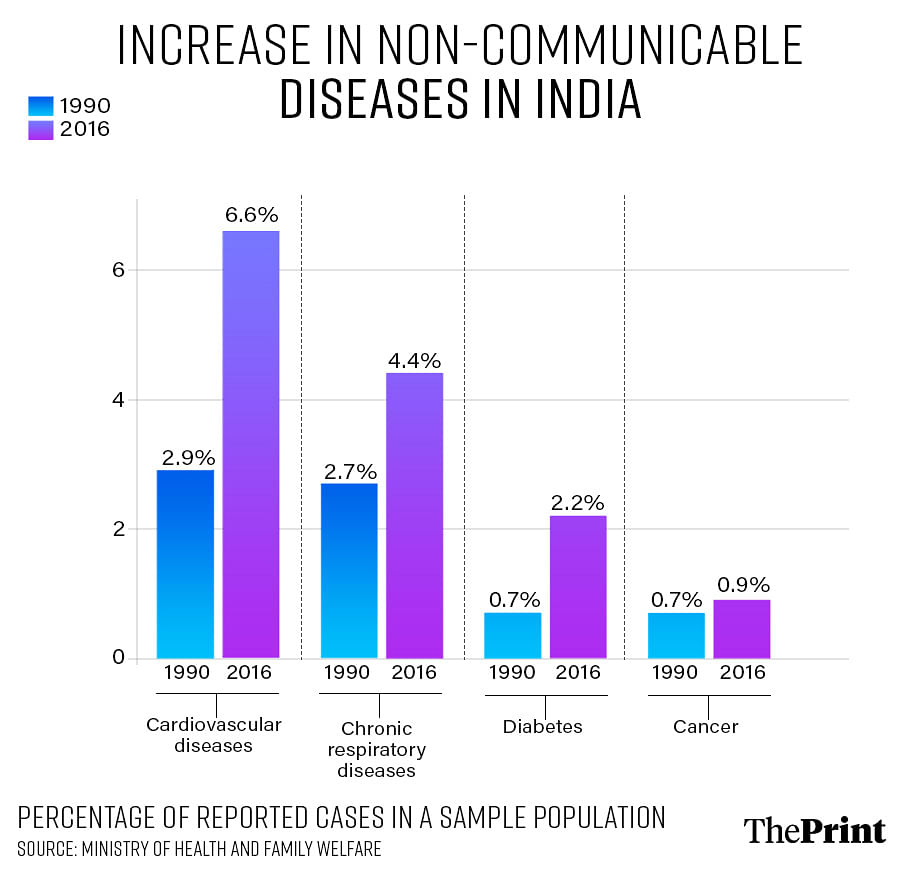New Delhi: Days after the Indian Council of Medical Research-National Institute of Nutrition (ICMR-NIN) released new dietary guidelines, health experts have stressed the importance of tailoring diets to Indian habits and lifestyles.
The new document prepared by ICMR-NIN provides 17 dietary guidelines, which touch upon various aspects, including rules for eating a variety of foods, for pregnant and lactating mothers, for children and adolescents, and for the optimal quantity of oil/fat use and sugar intake.
However, India is behind the long list of countries that already have detailed dietary guidelines for their citizens, some with multiple updated versions, to reduce the alarming spread of non-communicable diseases.
According to health experts ThePrint spoke to, Indians need such guidelines, especially since the dietary consumption of the country is becoming increasingly unhealthy — leaving people susceptible to lifestyle-related non-communicable diseases.
Notably, in a 2022 report released by the Union Ministry of Health and Family Welfare on the status of non-communicable diseases in India, the proportion of deaths due to such diseases increased to 61.8 percent in 2016 from 37.9 percent in 1990.
The most common diseases were cardiovascular diseases, cancers, chronic respiratory diseases (CDRs) and diabetes. It was also found that the rise in these diseases was primarily because of unhealthy diets, lack of physical activity, and use of tobacco and alcohol.
Additionally, the report highlighted a significant uptick in non-communicable diseases, with cardiovascular conditions escalating to 6.6 percent in 2022 from 2.9 percent in 1990 among a sample population. Similarly, diabetes cases surged to 2.2 percent from 0.7 percent. Chronic respiratory diseases also saw an increase, rising to 4.4 percent from 2.7 percent, and cancer diagnoses tripled to 2.2 percent from 0.7 percent within the same timeframe.

Dr Anuja Gaur, consultant in diabetes at Delhi’s Aakash Healthcare Super Speciality Hospital, said that the ICMR keeps issuing dietary advisories, but they need to be better publicised so that more people can benefit from them. Certain vulnerable groups also need to be prioritised in these guidelines, she added.
“For instance, guidelines need to be stricter for youngsters who are into fad diets these days. The youth should be made aware of the side effects of such diets and the rampant consumption of supplements and the so-called bodybuilding drugs and steroids,” Dr Gaur told ThePrint.
According to Dr V.K. Paul, a member of NITI Aayog who heads health and nutrition, Indians’ dietary habits have undergone significant changes over the past few decades, which have also increased the spread of non-communicable diseases in the country.
“The guidelines are designed to be flexible, accommodating the diverse cultural and regional dietary practices of India. They provide practical advice on the consumption of a variety of food from different food groups, emphasising the importance of a balanced and diverse diet,” he highlighted.
However, despite this advancement in India, some countries have been doing a lot more.
According to the United Nations Food and Agricultural Organisation (FAO), more than 100 countries have developed or are currently developing food-based dietary guidelines, many of which have been revised at least once. Such guidelines are also prevalent in various regions globally.
“Most countries in Asia and the Pacific, Europe, North America, Latin America and the Caribbean have national dietary guidelines. Food-based dietary guidelines have also been developed in a few countries in Africa and the Near East,” FAO said in their latest report on dietary guidelines issued earlier this year.
(Edited by Richa Mishra)
Also Read: May cause bone mineral loss, kidney damage — why ICMR dietary guidelines deter use of protein powders

